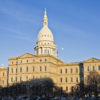Gambian Immigrant Elected Madison City Council President
Date: September 28, 2018
The list of Samba Baldeh’s volunteerism is long. A partial tally alone includes work with Big Brothers Big Sisters of America, Habitat for Humanity, the AIDS Network, Witness for Peace, along with various African associations and political groups.
“Just as I was involved in my community back home, I became very involved in the community here,” says Baldeh, who moved to Madison in 2000 from The Gambia, a tiny nation on Africa’s western coast.
Still, Baldeh thought he could do more. In 2015, he made his first bid for public office, beating a four-term incumbent by 32 votes for the City of Madison Common Council’s District 17 seat. “I knew that if I didn’t try I would never be able to know, to tell, if I would win or lose,” he says. In 2018, he was elected council president. He serves on 10 boards.
“It’s tough and busy, but I think it is one way to give back to the community, to make my immigrant community be part of the bigger community,” he says. “To give them comfort that where you live is your home.”
Baldeh was working in international youth development in Africa when he attended a conference in Washington, D.C., in 1999, where he met the student life coordinator for Madison Area Technical College. Intrigued by computer coursework available, he applied to the school, then went on to earn a master’s degree in IT project management at the University of Wisconsin.
I don’t know what is next. What I do know is I want to help make my city and my community better.
Over the next decade, he and a partner founded an IT consulting firm, at one point employing 13 people, and a restaurant with a staff of 12. Now he is scouting locations for a coffee shop and a new restaurant. His passion, however, lies in helping to bridge gaps in cultural understanding. As just one example, he organizes meetings between police officers and African immigrants — immigrants can learn that in America you don’t exit the vehicle at a traffic stop; police can learn why immigrants may not make eye contact.
“I don’t know what is next,” Baldeh says of his work. “What I do know is I want to help make my city and my community better.”





